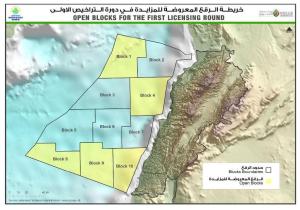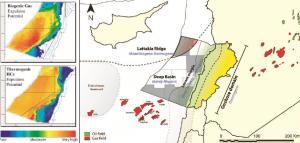nsnbc : Lebanon’s President, Prime Minister and Parliament Speaker, representing the country’s three most powerful population groups, stand united against Israel’s attempt to build a wall on Lebanese territory and potential threats to Lebanon’s territorial integrity and its offshore energy resources.
 Lebanon’s three top leaders, representing the country’s Sunni and Shia as well as Christian populations and the country’s national interests, accused Israel, on Tuesday, of threatening the stability of the border region between the two countries. President Michel Aoun, Prime Minister Saad al-Hariri, and Parliament Speaker Nabih Berri agreed to act to prevent Israel from building a wall on Lebanese land at the frontier, and threatening an offshore energy block in disputed waters.
Lebanon’s three top leaders, representing the country’s Sunni and Shia as well as Christian populations and the country’s national interests, accused Israel, on Tuesday, of threatening the stability of the border region between the two countries. President Michel Aoun, Prime Minister Saad al-Hariri, and Parliament Speaker Nabih Berri agreed to act to prevent Israel from building a wall on Lebanese land at the frontier, and threatening an offshore energy block in disputed waters.
Arguments over Israel’s attempt to build a wall on what Lebanon’s Army said is sovereign Lebanese territory and Lebanon’s plans to use the end of the political stalemate in the country to finally go ahead with the exploration of its offshore hydrocarbon blocks in the eastern Mediterranean have elevated tensions between the two countries.
Israel, for its part, claims the wall it is building is on Israeli sovereign land. The Lebanese government says it passes through territory that belongs to Lebanon but which lies on the Israeli side of the Blue Line, where the U.N. demarcated Israel’s withdrawal from southern Lebanon in 2000. The three Lebanese leaders met to study the recent “Israeli threats, and saw in them … a direct threat to the stability” of the border region, the president’s office said in a statement.
They agreed to take measures “at various regional and international levels to prevent Israel from building the cement wall…and from the possibility of infringing on Lebanon’s oil and gas wealth and its (territorial) waters,” it said.
Last week, Israeli Defense Minister Avigdor Lieberman called Lebanon’s first offshore oil and gas exploration tender “very provocative” and urged international firms not to participate. Lebanon has an unresolved maritime border dispute with Israel over a triangular area of sea of around 860 sq km (330 square miles). The zone extends along the edge of three of five energy blocks that Lebanon put to tender early last year.
Lebanon uses end of domestic political gridlock to finally explore its offshore resources
Lebanon’s offshore exploration had been slowed down by the political gridlock that plagued the country and by unresolved boundary disputes. Te country has been standing on the sidelines watching massive natural gas discoveries such as the Leviathan, Aphrodite and Karish produce gas for its neighbors. Now that the country is constitutionally governable again, it wants in on the action, attracting foreign investment for the development of its offshore wealth. “We want to make this sector a success story for the Lebanese,” Lebanon’s Minister of Energy and Water Cesar Abi Khalil said July 6 during an event hosted by the Mayer Brown law firm’s Houston office.
Lebanon is currently active offering exploration and production agreements to investors as part of the country’s first offshore licensing round. Aware that Lebanon is late Khalil said hus country has benefited from the experience of others in developing what he called an attractive legal framework.
Lebanon’s energy ministry is picking up where it left off when a political impasse left the country without a president for about two years, stalling its oil and gas E&P efforts as parliament debated action. Khalil commented on the situation saying: “We have been delayed, but this is the price of democracy you have to pay. … When the milestones coincide with parliamentary elections, presidential elections, formations of government, it has taken more time than it was supposed to. But now, as I said, we have passed all those milestones.”
Companies that prequalified in 2013 to participate in the licensing round may still participate, if eligibility criteria are met. Since then another pre-qualification round was opened. In all, more than 50 companies have pre-qualified to participate. The round was re-started earlier this year.
Lebanon is seeking bids from consortia comprised of one operator holding a minimum 35% stake and at least two unaffiliated right holders, each with a minimum 10% stake. Bid requirements include the submittal of a technical proposal describing planned exploration and seismic work and a commercial proposal containing the percentage of state share of profit petroleum and the cost petroleum recovery ceiling. Although each item will be independently evaluated, the commercial proposal is weighted at 70%. The local content percentage is 80%. The minister seemed confident the local workforce is capable, but said the percentage would not be a deal breaker.
The ministry’s job now is to make sure interested companies submit bids by the September 15, 2018 deadline, Khalil said, adding the high level of interest speaks to region’s offshore potential.
CH/L – nsnbc 07.02.2018
Source Article from https://nsnbc.me/2018/02/07/lebanon-stands-united-against-israeli-attempts-to-annex-land-and-offshore-energy-resources/
Related posts:
Views: 0
 RSS Feed
RSS Feed

















 February 7th, 2018
February 7th, 2018  Awake Goy
Awake Goy 











 Posted in
Posted in  Tags:
Tags: 
















